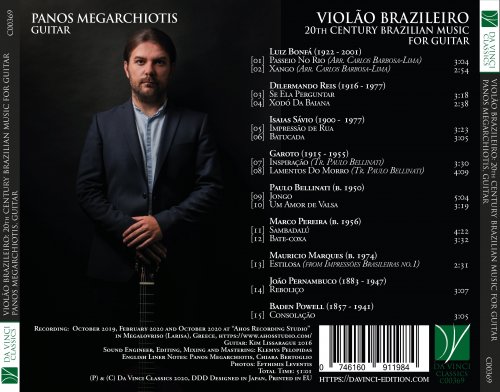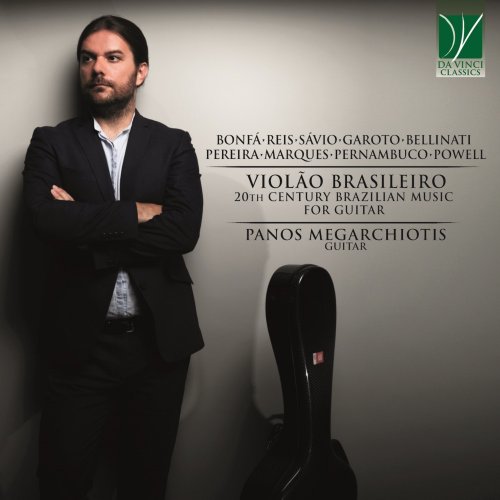
Panos Megarchiotis - Violão Brasileiro (2021)
BAND/ARTIST: Panos Megarchiotis
- Title: Violão Brasileiro
- Year Of Release: 2021
- Label: Da Vinci Classics
- Genre: Classical Guitar
- Quality: flac lossless
- Total Time: 00:51:01
- Total Size: 213 mb
- WebSite: Album Preview
Tracklist
01. Passeio No Rio (Arranged by Carlos Barbosa-Lima)
02. Xango (Arranged by Carlos Barbosa-Lima)
03. Se Ela Perguntar
04. Xodó Da Baiana
05. Impressão de Rua
06. Batucada
07. Inspiração (Transcription by Paulo Bellinati)
08. Lamentos Do Morro (Transcription by Paulo Bellinati)
09. Jongo
10. Um Amor de Valsa
11. Sambadalú
12. Bate-coxa
13. Impressões Brasileiras No.1: I. Estilosa, valsa
14. Reboliço
15. Consolação

The guitar is Brazil’s national instrument and has played an important role in the evolution of Brazilian music, especially during the twentieth century. As a classical guitar student, I came across Brazilian guitar music already during my first years of studying and its unique charm and beauty fascinates me even after all these years.
The first time to present this repertoire in a thematical concert and to write about the Brazilian guitar music was at the final project of one of my Master programmes at the Zurich University of Arts. Since then I often give concerts based on this repertoire and my goal is to enrich it with pieces that are not often played or even unknown. It was a really difficult task to decide which pieces should be included in this album. I couldn’t resist playing some famous pieces that I love, but I also tried to include pieces that are not well known . There are so many wonderful Brazilian composers with lovely pieces and it’s impossible to include all of them in one album. Nevertheless, a purpose of this recording is to encourage the listener to investigate further the endlessly charming world of Brazilian guitar music.
Brazilian music is a unique blend of European harmony and melody, African rhythms and Native American culture. Starting in the 17th century, slaves from Africa brought along the impassioned drumming of their candomble rituals. The first Portuguese colonists added their ballads who were accompanied with cavaquinhos, the bandolim, bagpipes and the Portuguese guitar. Body movement, inspired largely by the undulating dances of the African slaves was incorporated into Brazilian music. Even European-imported dance rhythms like the polka and mazurka were adapted and tropicalized into the maxixe, a kind of tango that became popular during the 1920s...
01. Passeio No Rio (Arranged by Carlos Barbosa-Lima)
02. Xango (Arranged by Carlos Barbosa-Lima)
03. Se Ela Perguntar
04. Xodó Da Baiana
05. Impressão de Rua
06. Batucada
07. Inspiração (Transcription by Paulo Bellinati)
08. Lamentos Do Morro (Transcription by Paulo Bellinati)
09. Jongo
10. Um Amor de Valsa
11. Sambadalú
12. Bate-coxa
13. Impressões Brasileiras No.1: I. Estilosa, valsa
14. Reboliço
15. Consolação

The guitar is Brazil’s national instrument and has played an important role in the evolution of Brazilian music, especially during the twentieth century. As a classical guitar student, I came across Brazilian guitar music already during my first years of studying and its unique charm and beauty fascinates me even after all these years.
The first time to present this repertoire in a thematical concert and to write about the Brazilian guitar music was at the final project of one of my Master programmes at the Zurich University of Arts. Since then I often give concerts based on this repertoire and my goal is to enrich it with pieces that are not often played or even unknown. It was a really difficult task to decide which pieces should be included in this album. I couldn’t resist playing some famous pieces that I love, but I also tried to include pieces that are not well known . There are so many wonderful Brazilian composers with lovely pieces and it’s impossible to include all of them in one album. Nevertheless, a purpose of this recording is to encourage the listener to investigate further the endlessly charming world of Brazilian guitar music.
Brazilian music is a unique blend of European harmony and melody, African rhythms and Native American culture. Starting in the 17th century, slaves from Africa brought along the impassioned drumming of their candomble rituals. The first Portuguese colonists added their ballads who were accompanied with cavaquinhos, the bandolim, bagpipes and the Portuguese guitar. Body movement, inspired largely by the undulating dances of the African slaves was incorporated into Brazilian music. Even European-imported dance rhythms like the polka and mazurka were adapted and tropicalized into the maxixe, a kind of tango that became popular during the 1920s...
Year 2021 | Classical | FLAC / APE
As a ISRA.CLOUD's PREMIUM member you will have the following benefits:
- Unlimited high speed downloads
- Download directly without waiting time
- Unlimited parallel downloads
- Support for download accelerators
- No advertising
- Resume broken downloads


